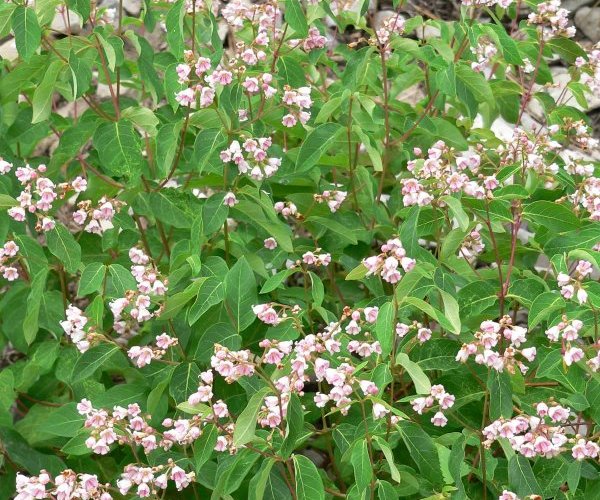Bitterroot has many common names: dogbane, milkweed, catchfly, flytrap, honey bloom, mountain helm, and wallflower.
Contents
Habitat
Bitterroot is found in the Atlantic and Pacific coastal states. It grows in dry, sandy soils and around the forest edges, on roadsides and fields.
Description
Bitterroot grows up to 100 centimeters in height. Leaves are opposite, spreading or drooping and glabrous above. Stems are erect and diffusely branched, hairless, and lack a central axis.
Part used
The medicinal part is derived from the root.

Traditional Uses and Benefits
Bitterroot acts on the heart, urinary and respiratory systems, and uterus. It was widely employed by the native North American Indians who used it to treat a wide variety of complaints, including headaches, convulsions, earache, heart palpitations, colds, insanity, and dizziness.
The root is cardiotonic, cathartic, diaphoretic, diuretic, emetic, and expectorant. It has a powerful action in slowing the pulse and has a powerful effect on the vaso-motor system. It is an irritant to the mucous membranes.
Fresh root juice can be used in the treatment of syphilis and warts. The root decoction can be used once a week to prevent conception.
The green fruits decoction can be used for the treatment of heart, kidney problems, and dropsy.

Dosage and Precautions
For an infusion, take one teaspoon of dried bitter root rhizome in 500 mL boiling water. Cool it down and use 2-3 teaspoons six times per day.
In the form of a tincture, use 5-10 drops before the meal.
Warning! It is poisonous to livestock. Not to be used without a medical purpose. The root contains cymarin, a cardioactive glycoside that is toxic to ruminants. Bitterroot fruit decoction may irritate the intestines and cause unpleasant side-effects.
DISCLAIMER
The content and information on newerapost for information and educational purposes only. It is not for self-diagnosis and self-treatment. The content is not a medical manual. Before beginning the use of any prescription, medication and pursuing any self-treatment, all readers should consult a physician.
The information given in this article is intended to help you make informed decisions for your health. You must consult with your doctor before pursuing any natural remedies if you are under care for any health condition.
Do not take any vitamins, minerals, herbs, or other supplements without consulting your doctor, if you are taking any medication. The website does not make a representation, express or implied, regarding the accuracy of the information and does not accept any single responsibility for any errors or misuse.

